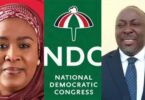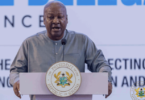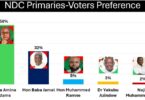Source: Myjoyonline.com
Former Deputy Attorney General and MP for Bolgatanga East constituency, Dr Dominic Akuritinga Ayine has served notice that come Tuesday, October 22, members of the National Democratic Congress will proceed with parliamentary business even if their New Patriotic Party colleagues boycott the house.
The NPP members, led by their leader Alexander Afenyo-Markin, on Thursday declared a conditional boycott of the house following Speaker Alban Bagbin’s declaration of four seats vacant.
Three of the affected seats belong to the NPP, with the fourth held by the NDC. The decision has engendered a new leadership crisis in parliament, with the NDC which has been the Minority now claiming to be in the Majority.
And according to Dr. Ayine, the “new regime” will kick in on Tuesday when sitting resumes, and on behalf of the electorate, they in the NDC will do what is possible and just, including repealing acts that are ‘repealable’.
While speaking on Citi FM Friday morning, Dominic Ayine wasted no time in pointing at the Electronic Transfers Levy, otherwise called e-Levy, as a policy likely to face repeal proceedings.
Arguing that the issues of who constitutes majority or minority in parliament is by way of numerical strengths and are “as clear as daylight”, he said if there are issues that require simple majority rather than a two-thirds majority, they will proceed in the absence of the NPP members who say they will only return to the house upon a ruling by the Supreme Court on an injunction application against the Speaker.
Said Ayine; “We will be filing private members motions.. We will repeal the obnoxious pieces of legislation they have passed, the taxes such as e-Levy and so on and so forth. In fact we will start implementing our manifesto on Tuesday.”
“You mean you’ll start doing your own thing”, suggested host Bernard Avle, to which Dr. Ayine responded; “No, it’s not our own thing, we are working on behalf of the people of this country, we were elected to work on behalf of the people of this country so if they stay out, we have the mandate of the people to repeal e-Levy and change the fortunes of the people of this country instantaneously. So they should stay off, we will do business.”
The opposition NDC has hardly hidden its opposition to the Electronic Transfer Levy (e-Levy) since its proposal and subsequent implementation in the 2022 budget to generate revenue from electronic financial transactions, including mobile money transfers, bank transfers, merchant payments, and inward remittances
On November 17, 2021, Finance Minister Ken Ofori-Atta presented the 2022 budget, which included the introduction of a 1.75% e-Levy on electronic transactions.
The NDC, led by its Minority in Parliament, strongly opposed the e-Levy, calling it regressive and burdensome for Ghanaians, especially the poor and those who rely on mobile money services. They argued it would increase the cost of living and hurt small businesses and low-income earners.
As Parliament debated the budget and the e-Levy, NDC MPs staged a strong resistance, and on December 20, 2021, tensions escalated in Parliament when MPs attempted to vote on the e-Levy. The session ended in a physical brawl between NPP and NDC MPs, with the Speaker of Parliament, Alban Bagbin, exiting the chamber during the chaos.
The Minority alleged that the government had bypassed proper procedures to pass the e-Levy without consensus.
Following the clashes in Parliament, the NDC intensified its opposition to the e-Levy by organising public forums, demonstrations, and press conferences. They argued that the government should explore other revenue-generating avenues instead of taxing citizens through electronic transactions.
Key NDC leaders, including the party’s presidential candidate John Dramani Mahama, spoke against the levy, calling it exploitative.
The NDC also capitalised on growing public dissatisfaction, rallying various civil society groups, trade unions, and individual citizens to voice their opposition to the tax. Many Ghanaians, particularly mobile money agents and small business owners, expressed concerns that the e-Levy would negatively impact their livelihoods.
On February 1, 2022, the Minority in Parliament boycotted a Finance Committee meeting called to discuss the e-Levy. They maintained that the levy was not in the best interest of Ghanaians and should be scrapped or at least significantly reduced.
The NDC threatened to challenge the e-Levy in court if it was passed under contentious circumstances. They questioned the legality of the government pushing through the tax without broader consultation and parliamentary consensus.
Despite the NDC’s strong opposition, the e-Levy was passed by Parliament on March 29, 2022, in a session marked by the absence of NDC MPs. The government managed to pass the bill with the NPP Majority in the house.
Following the passage, the NDC continued its opposition through public demonstrations. On May 1, 2022, a large protest dubbed the “Yentua” demonstration (“We Won’t Pay” in Akan) was organised in Accra, led by the NDC and various activist groups.
Then in June 2022, three NDC MPs—Haruna Iddrisu (Minority Leader), Mahama Ayariga, and Samuel Okudzeto Ablakwa—filed a lawsuit at the Supreme Court, challenging the constitutionality of the e-Levy’s passage. They argued that the bill was passed without the Speaker of Parliament and without the required quorum.
On July 27, 2022, the Supreme Court ruled in favour of the government, dismissing the NDC’s case against the e-Levy’s passage. The court held that the government had followed proper procedures in passing the tax.
As the government proceeded with the implementation of the e-Levy, the NDC maintained its opposition, vowing to repeal or review the levy if they won the 2024 general election. John Dramani Mahama has promised to reverse the e-Levy if the NDC came to power, citing it as an unfair burden on the populace.








